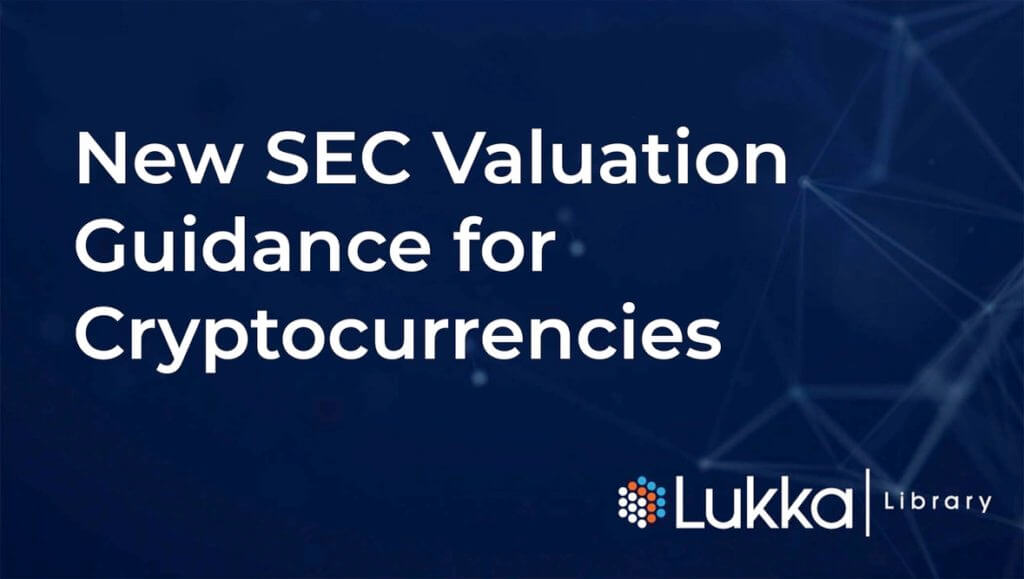Author: Dr. Gerard (Rod) Brennan; Advisor for Lukka & Adjunct Professor Teaching Advanced Audit and Information Technology in the Rutgers Professional Accounting MBA Program; Rutgers Business School; Newark, New Jersey.
The author is writing on his own behalf and none of the statements should be attributed to Lukka or The Rutgers Business School.
The statements in this document should not be treated as legal, tax, or accounting advice. The document is intended to provide general information only. If a person would like such advice, they should seek professional advice with regard to their specific facts.
The statements in this document reflect guidance issued as of May 4th, 2020.
The recently proposed guidance from the SEC has important implications for the current valuation practice for many registrants preparing financial statements filed with the Commission. Registrants now have long-awaited additional guidance and clarity on asset valuation from the SEC that applies to most all asset classes including cryptocurrency.
Like other respected regulators in the US and abroad (e.g., FASB and IASB), the SEC has been mostly silent in providing specific codified or non-authoritative guidance on the appropriate accounting treatment of cryptocurrencies. Perhaps some topics can wait for specific guidance from regulators to catch up with current practice, but valuation is an area where cryptocurrencies need to quickly align with existing regulatory guidance for similar assets or have new specific guidance crafted to address the unique distinctive of this emerging asset class.
The area of valuation of cryptocurrencies is one that needs to align/be addressed now – as many funds and other qualified investment companies hold increasingly material balances in cryptocurrencies which must be valued on a regular basis to strike NAV, calculate gains, and losses from sales, etc. The SEC released on April 21, 2020, a proposed rule “2a-5” designed to update circa 1970 valuation guidance from the Commission to help funds address changes in the markets and types of assets (including new assets such as cryptocurrencies). This paper will consider some of the key implications of existing and proposed SEC guidance on the appropriate methods of fair value accounting under both FASB ACS-820 and IASB IFRS-13 for cryptocurrencies/crypto assets held by funds and related qualified investment companies.
New and Existing Valuation Guidance from the SEC/FASB:
The Investment Company Act of 1940 established the first real authoritative guidance for registered investment companies or business development companies (a “fund”) addressing a very different investment environment without many of the current unique investment instruments, some of which have emerged just in the past decade. While updates have been made, the Commission last addressed valuation practices under the Investment Company Act in a comprehensive manner in a pair of releases issued in 1969 and 1970. Since then, markets and fund investment practices have evolved considerably.2
Proposed rule 2a-5 April 2020 would require the performance of certain functions in order to determine fair value in good faith. These functions include, for example:
- Periodically assessing and managing material risks associated with fair value determinations, including material conflicts of interest;
- Selecting, applying, and testing fair value methodologies; and
- Overseeing and evaluating any pricing services used.
The proposed rule would also require the adoption and implementation of written policies and procedures addressing fair value determination and the maintenance of certain records. Under the Act, fund investments must use fair value where market quotations are not “readily available.” The proposal would treat a market quotation as “readily available” only when that quotation is a quoted price (unadjusted) in active markets for identical investments that the fund can access at the measurement date. The proposal would also provide that a quotation is not readily available if it is not reliable.
This overview recognizes the growing use of reputable independent third-party pricing services and the proposed requirement to mandate the application of fair value accounting to inactive or thinly-traded assets as well as those with observable events in active markets (which was already in the existing SEC guidance). Thinly-traded assets in inactive markets exist in many asset classes including cryptocurrencies, and under the Proposed rule 2a-5 these should also use fair value in good faith for valuations. When the SEC encourages the use of fair value accounting, it requires alignment with the fair value standards provided by the FASB-issued guidance in ASC-820. “The Commission stated its determination that the FASB and its parent organization, the Financial Accounting Foundation, satisfied the criteria in section 19(b) of the Securities Act and, accordingly, FASB financial accounting and reporting standards are recognized as “generally accepted” under the federal securities laws. As a result, registrants are required to comply with those standards for the recognition, measurement, and disclosure in preparing financial statements filed with the Commission, unless the Commission provides otherwise.”3
FASB fair value guidance under ASC-820 and its convergent international counterpart issued by the IASB under IFRS-13 provide specific, comprehensive fair value guidance for actively-traded and thinly-traded assets of all types. ASC 820 allows for different valuation methods, including the market approach, income approach, and cost approach, while providing a careful leveling to aid practitioners in determining the appropriate valuation approach. The levels are as follows:
- Level 1 inputs are “quoted prices (unadjusted) in active markets for identical assets or liabilities that the reporting entity can assess at the measurement date.”
- Level 2 inputs are “inputs other than quoted prices included within Level 1 that are observable for the asset or liability, either directly or indirectly.”
- Level 3 inputs are “unobservable inputs for the asset and liability.4
About 63% of fund assets are valued using Level 1 inputs. Nevertheless, the average percentage of securities valued using Level 1 inputs varies with the type of fund, ranging from 26% for closed-end funds to 99% for ETFs registered as UITs. About 33% of fund assets are valued using Level 2 inputs.5 FASB & IASB Fair Value Accounting guidance under ASC-820 and IFRS-13 require that Level 1 assets (i.e. quoted prices unadjusted, in active markets for identical assets) determine fair value with a mark to market approach by first identifying the “Principal Market” and then using the “last price” in that market to establish a valuation. For Level 2 or 3 assets with limited or no observable transactions, the guidance allows for the use of careful/consistent mark-to-model approaches to establish value.
Implications for Cryptocurrency/Crypto Asset Valuations:
The implications of the proposed and existing valuation guidance from the SEC discussed above for cryptocurrencies represents a radical departure from current valuation practice for many registrants preparing financial statements filed with the Commission. Many funds and other qualified investment companies are instructed by their boards to use internal valuation methodologies or published index averages which do not align with the ASC-820 fair value standards as required. Internal pricing desks lack independence and the use of crypto indexes does not align with the current FASB/IFRS guidance. The FASB and other regulators’ established guidance is clear that level 1 assets trading in active markets with observable transactions must use executed prices and not selected markets or indexes to determine fair value. Level 2 or 3 assets under the new guidance are also required to use a fair value approach consistent with ASC Topic 820.
Independence is a key concern of the widely used practice of internal pricing desks establishing or influencing valuations for a firm given the potential for insider bias in striking NAV or determining appropriate reporting positions. The SEC defines the independent evaluator as “a person who has expertise in the valuation of securities and other financial assets and who is not an interested person of the Eligible Unregistered Fund or any affiliate thereof”6. It is increasingly critical that cryptocurrency valuations are appropriately independent as is required for valuations of other asset classes.
Another key aspect of the SEC’s new proposed guidance is the use of pricing services. The proposed rule provides that determining fair value in good faith requires the oversight and evaluation of pricing services used to determine valuations. This provision is designed to help ensure that pricing information received from pricing services serves as a reliable input for determining fair value in good faith. For funds that use pricing services, the proposed rule would require that the board or adviser establish a process for the approval, monitoring, and evaluation of each pricing service provider7. The nature of cryptocurrencies and the complexity and fragmentation of the respective markets really demands the use of a cryptocurrency-centric pricing service to establish fair value aligned with FASB Topic 820. Establishing the “Principal Market” for actively traded cryptocurrencies under the guidance is complex because there are over 200 exchanges operating around the world, across most all time zones, managing thousands of cryptocurrencies. Equally complex, is establishing the appropriate last or “exit” price as most of these crypto exchanges never close. Innovative SOC 1 & 2 accredited crypto centric firms such as “Lukka Tech” (Lukka.tech) have developed robust ASC-820/IFRS- 13 aligned automated pricing services which carefully align with the requirements of the fair value standards and include compliance and efficiency requirements for these crypto exchanges to help provide appropriate independence, mitigate manipulation, and help assure only secure principal crypto markets are selected for valuations of actively traded cryptocurrencies.
Conclusion
Clearly this new economic phenomena of cryptocurrency/crypto assets has come of age and needs to align now with existing accounting standards while awaiting more asset-specific guidance from US and international regulators. The recent SEC guidance outlined above can and must apply to cryptocurrencies as to any other asset class and firms and boards must comply now with existing and proposed guidance. For over 10 years cryptocurrencies have played an increasingly material and important role in the worldwide economic engine, and they promise to play an even bigger role in the near term future. Specific authoritative guidance is coming and is perhaps overdue, but in the interim, it is incumbent on firms and the accounting profession at large to carefully establish consistent practice and leverage existing guidance for similar assets to provide uniform approaches to valuation.
1 SEC Press release 2020-93 – “SEC Proposes to Modernize Framework for Fund Valuation Practices” April 21, 2020, Page 1
https://www.sec.gov/news/press-release/2020-93
2 SECURITIES AND EXCHANGE COMMISSION 17 CFR Parts 210 and 270 Release No. IC-33845; File No. S7-07-20 RIN 3235-AM71 Page 146.
3 SECURITIES AND EXCHANGE COMMISSION 17 CFR Parts 210 and 270 Release No. IC-33845; File No. S7-07-20 RIN 3235-AM71 Page 81
4 SECURITIES AND EXCHANGE COMMISSION 17 CFR Parts 210 and 270 Release No. IC-33845; File No. S7-07-20 RIN 3235-AM71 Page 24
5 SECURITIES AND EXCHANGE COMMISSION “Valuation of Portfolio Securities and other Assets Held by Registered Investment Companies – Select Bibliography of the Division of Investment Management” Rule 17a-8 Page 1. Link: https://www.sec.gov/divisions/investment/icvaluation.htm
6 SECURITIES AND EXCHANGE COMMISSION 17 CFR Parts 210 and 270 Release No. IC-33845; File No. S7-07-20 RIN 3235-AM71, Page 25



